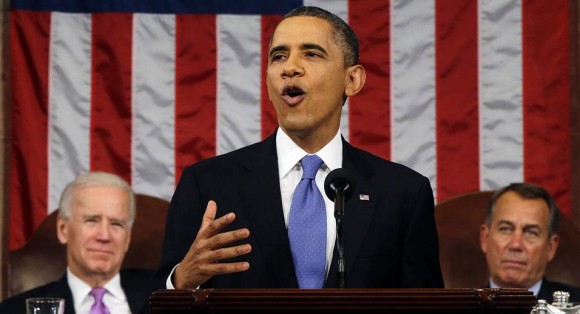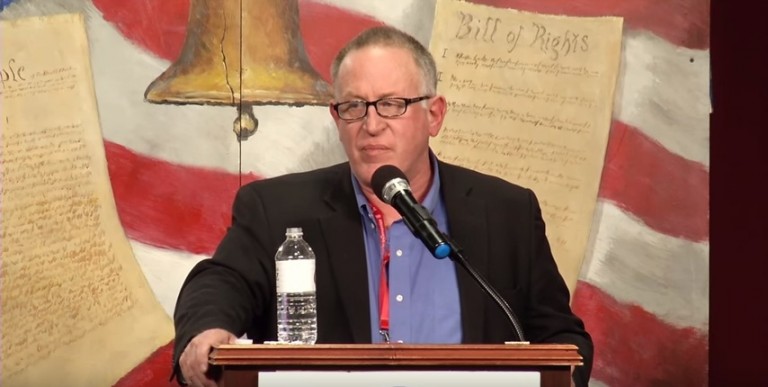By: Roger Aronoff
Accuracy in Media

Following last year’s State of the Union address by President Barack Obama, I titled my column “The State of the Union is Mendacity.” It is quite remarkable how little within it would need to be changed to have it apply to this week’s State of the Union. From the recovering economy, to negotiations with Iran, to the containment and defeat of “violent extremism,” to equal pay for women and the need to combat climate change, to a call for a minimum wage hike—there is little difference between the laundry lists presented by President Obama in 2014 and 2015.
But there is a major difference in the political climate.
“The most important omission [in the President’s State of the Union] was the fact that there were 83 fewer Democrats in the chamber this year than the first time he gave a State of the Union speech and dozens less than the number of his fellow party members that were there last year,” writes Jonathan S. Tobin for Commentary magazine. “The historic rejection of both the president’s party and his policies in last November’s midterm elections was treated in the speech as if it had never happened.”
Instead, America was treated to a laundry list of liberal agenda items, right after President Obama first said he would “focus less on a checklist of proposals, and focus more on the values at stake in the choices before us.”
“When we looked at what Obama actually proposed, all we found was a musty laundry list of liberal programs, most of which already got huge boosts in spending and failed to deliver on their promises,” comments Investors Business Daily.
Yet President Obama’s worn-out list was greeted with praise from the mainstream media. NBC Today Show co-host Savannah Guthrie cheered Obama as “displaying renewed swagger in his sixth address to the nation as he outlined a vision for the final two years of his presidency.”
The New York Times said that “It was hardly surprising that a president who expects so little from Congress devoted some of his speech to celebrating the things that he has accomplished against considerable odds.”
“In fact, he seemed so confident you would have thought he had just won another election,” asserted Jonathan Karl of ABC News.
President Obama’s comment that he has “no more campaigns to run” was greeted with applause and laughter, to which he retorted, “I know because I won both of them.”
Rather than pointing to how the 2014 election could be seen as a referendum on President Obama’s failed policies, Matt Lauer, co-host of NBC’s Today Show, asked Vice President Joe Biden whether he saw “that as a moment of disrespect? Was it a symptom of the very pettiness that the President was referring to?” He also salivated over a potential 2016 Biden presidential bid, asking, “You’re known as a guy who can work a room. Boy, are you good at that. Do you think you could work that room, Vice President Biden?” Lauer didn’t ask a single question challenging any of Obama’s claims or assertions from the night before.
While the mainstream media cheer, others have a more critical view of what Tobin calls Obama’s credibility gap “that is as wide as the Grand Canyon.”
“What Obama has delivered is not an address, but a black hole of lies in which each lie clusters next to a dozen more until it is impossible to see the light,” writes Daniel Greenfield. For example, “Obama insists on taking credit for an energy revolution that he battled every step of the way and continues to fight with his Keystone veto threat,” writes Greenfield. “Instead of admitting that fracking and cheap Saudi oil made the difference, he went on touting his solar and wind boondoggles that have cost a fortune.”
President Obama also touted such green energy “successes” in his 2014 address.
“Obama also claims to have beaten Putin,” writes Greenfield. “There’s only one minor problem with that. In the real world, Russia still controls Crimea. While in the unreal world, Obama controls CNN.”
And The Washington Post editorial board concluded the day after President Obama’s State of the Union, that there is a “pervasive disconnect in Western thinking about the regime of Vladimir Putin”—and that “Russian forces, after several weeks of relative calm” had just “launched a new offensive in eastern Ukraine.”
President Obama also asserted in his speech that “we’ve halted the progress of the nuclear program” in Iran and “reduced its stockpile of nuclear material.” He then threatened to veto any sanctions bill “that threatens to undo this progress.” He is referring to a likely bipartisan bill calling for additional sanctions if negotiations with Iran fall apart. The idea is to incentivize Iran to make a deal wherein it agrees to end its nuclear weapons capability, but President Obama says that if Congress were to pass such a bill, “the risks and likelihood this ends up at some point a military confrontation is heightened.”
“The more I hear from the administration and its quotes, the more it sounds like talking points that come straight out of Tehran,” said Democratic Senator Robert Menendez (NJ) the day after the President’s speech.
The Washington Post’s Fact Checker column took a look at the claims by the President of having “halted the progress of the nuclear program” and of having “reduced its stockpile of nuclear material,” and gave those claims three Pinocchios, meaning, “Significant factual error and/or obvious contradictions.”
Regarding the President’s refusal to refer to “Islamic” terrorism or extremism, another Democrat took exception. She is Rep. Tulsi Gabbard who is and has been in the Army National Guard for more than a decade. She served a one-year combat tour of duty in Iraq starting in 2004, and a second tour in the Middle East a few years later. Gabbard is the first American Samoan and the first Hindu to serve in the U.S. Congress—now in her second term—representing a district in Hawaii. Gabbard was on Neil Cavuto’s show on the Fox News Channel, and told Cavuto:
Terminology in the use of this specific term is important…last night the President came and talked to Congress about coming to request an authorization to use military force. By his not using this term, Islamic extremism, and clearly identifying our enemy, it raised a whole host of questions in exactly what congress will be authorizing. Who will we be targeting? Who is our enemy? And unless you understand who your enemy is, unless you clearly identify your enemy, then you cannot come up with a very effective strategy to defeat that enemy. So this is what’s giving me great concern as we look specifically at this authorization, but also as we look at this overall issue of how do we defeat this threat of Islamic extremism that’s not just occurring in the Middle East, that isn’t just about this one group called ISIS, or another group called al Qaeda. It’s a much larger war, really, that is as much an ideological war as it is a military war.
Amidst the dangerously conciliatory stance that the President has adopted toward Iran, and the weak military effort to “degrade and defeat ISIL,” the media should praise Speaker John Boehner (R-OH) for inviting Israel’s Prime Minister Benjamin Netanyahu to speak to Congress about the growing Iranian threat. Instead, Politico criticizes that “the Speaker didn’t consult with the administration before inviting Netanyahu to address Congress,” and the Speaker is “setting up his most dramatic foreign policy confrontation with President Barack Obama to date.” The speech is scheduled for March 3rd.
Not only is Congress a co-equal branch of government, with the ability to invite whomever they want, but President Obama made the highlight of his last State of the Union executive action—and going around Congress when they won’t comply with his agenda.
“He expects us to stand idly by and do nothing while he cuts a bad deal with Iran. Two words: ‘Hell no!’ … We’re going to do no such thing,” said Speaker Boehner.
The Speaker’s move is a show of support for Israel, and the Western leader who, more than any other, faces the daily threat of Islamic jihadist terrorism, and the very real threat of an Iranian regime that has explicitly stated on numerous occasions their plans to wipe Israel off the face of the earth.
The White House has already announced that the President won’t be meeting with Netanyahu on that trip, saying that it’s too close to Israel’s election, also slated for March. It will be interesting to see what, if any, pressure the Obama administration puts on Netanyahu to cancel his planned address. Speaker Boehner is betting that Netanyahu has more credibility in this country on Iran and Islamic jihadi terrorism than President Obama does. And there is probably no one who can better speak to these matters with such authority and eloquence.
It should certainly make for a better speech than this year’s policy prescriptions recycled from last year, even if the media were determined to shower President Obama with undeserved, fawning praise for simply showing up.

















